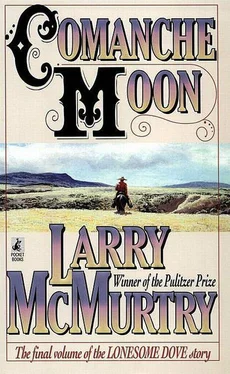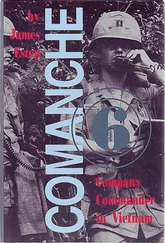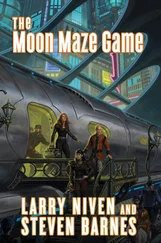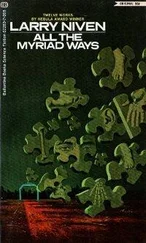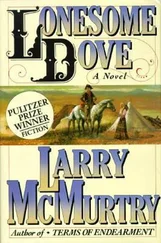Kicking Wolf didn't know. His head hurt, his friend was lost, and he had many days of riding before he got home. When he got home--if he did--no one would sing for him, either.
Even so, Kicking Wolf wanted to be home.
He wanted to see Worm. Maybe he was wrong about the old spirits. Maybe it was one of Ahumado's witches who had made the trouble in his eyes. Maybe Worm could cure him so that, once again, he would only see what was there.
When Scull awoke Hickling Prescott was on his mind and the smell of cooking meat was in his nostrils. His mother, a Ticknor, had been a childhood friend of the great historian, whose house stood only a block down the hill from the great Georgian town house where Inish Scull had grown up. The world knew the man as William Hickling Prescott, of course, but Scull's mother had always called him "Hickling." As Inish Scull was leaving for the Mexican War he had gone by to pay his respects to the old man, then blind and mostly deaf. It was well to know your history when going off to battle, Scull believed, and certainly his mother's friend, Hickling Prescott, knew as much about the history of Mexico as anyone in Boston--or in America, for that matter. To Hickling Prescott, of course, Boston .was America --z much of it, at least, as he cared to acknowledge.
Twice before, during the few weeks he had spent in Boston, Scull had made the mistake of taking Inez along when visiting the old man. But Hickling Prescott didn't approve of Inez. Although he couldn't see or hear and wasn't expected to feel, somehow Inez's determined carnality had impressed itself on the historian, who was not charmed. He didn't believe the sons of Boston should marry women from the South--and yet, to his annoyance, not a few sons of Boston did just that.
"Why, the South's just that riffraff John Smith brought over, Mr. Scull," the old man said. "Your wife smells like a Spanish harlot. I sat next to her at dinner at Quincy Adams's and I smelled her. Our Boston women don't smell--at least they smell very rarely. The Oglethorpes were low bred, you know, quite low bred." "Well, sir, Inez is not an Oglethorpe, but I admit she can produce an odor once in a while," Inish said.
"There are several appealing misses right here in Boston," Hickling Prescott informed him crisply. "I hardly think you needed to root around in that Oglethorpe bunch just to find a wife." He sighed. "But it's done, I suppose," he said.
"It's done, Mr. Prescott," Inish admitted. "And now I'm off to Mexico, to the fight." "Have you read my book?" the old man asked.
"Every ^w," Inish assured him. "I intend to reread it on the boat." "The Oglethorpes produced many fine whores," old Prescott said. "But, as I said, it's done. Now I'm working on Peru, and that isn't done." "I'm sure it will be masterly, when it comes," Inish said.
""Magisterial,"' I would have said," old Prescott corrected, sipping a little cold tea. "I don't expect we'll have to fight Peru, at least not in my time, and I have no advice to offer if we do." "It's Mexico we're fighting, sir," Inish reminded him.
There was a silence in the great dim room, whose windows were hung with black drapes. Inish realized he had misspoken. William Hickling Prescott no doubt knew who the nation was about to go to war with.
"It was reading your great book that made me want to join this war," Inish told him, anxious to make up for his slip. "If I might say so, your narrative stirs great chords in a man.
Heroism--strife--the city of Mexico.
Victory despite great odds. The few against the many. Death, glory, sacrifice." The historian was silent for a moment.
"Yes, there was that," he said dryly. "But this one won't be that way, Mr. Scull. All you'll find is dust and beans. I do wish you hadn't married that Southern woman. What was her name, now?" "Dolly," Inish reminded him. "And I believe her people came over with Mr. Penn." "Oh, that hypocrite," the historian said.
"It must have been a great sorrow to your mother--yr marriage, that is. I miss your mother. She was my childhood friend, though the Ticknors in general are rather a distressing lot. Your ma got all the shine in that family, Mr. Scull." "That she did," Inish agreed.
There were no black drapes in the stony canyon where Scull had awakened, thinking of Hickling Prescott. The walls of the canyon were pale yellow, like the winter sunlight. Scull had slept without a fire and awoke stiff and shivering. On such a morning a little of Inez's unapologetic carnality would not have been unwelcome.
Of course, he was in Mexico, whose conquest Hickling Prescott had chronicled so vividly. Cort@es and his few men had captured a country and broken a civilization.
When Scull had gone to the old man's house on the eve of his departure for the war, he had meant to probe a little, to get the old man's thoughts on events which he probably understood as well as any living man. But the old man had been indifferent, opaque; what he knew was in his book and he did not see the point in repeating it to the young man.
"I ain't a professor, they've got some of them at Harvard," he had said.
"Whip 'em and get home, sir," he advised, showing Inish to the door. That he had actually risen from his chair and walked Inish to the door was, Inish knew, a great compliment--there was, after all, a butler to show visitors in and out. The compliment, no doubt, was inspired by the historian's fond memories of his mother.
"I'd leave that Oglethorpe girl down in Georgia, if I were you," the old man said, as he stood in the door, looking out on the Boston he could not see. "She won't do much harm if she's in Georgia--the Oglethorpe smell don't carry that far." But it was a meaty smell, not the memory of the old, crabbed historian, that had awakened Inish Scull from his chilly sleep in the Yellow Canyon. What he smelled was meat cooking.
He didn't take in the smell with every breath, but, intermittently, every few minutes, when there would be a certain shift in the wind, then came the smell.
Scull cautiously looked around. The land was broken and humpy. Perhaps someone else was camped behind one of the humps, cooking a deer or a pig.
And yet, a fire would have meant smoke, and he saw no smoke.
It's dream meat, he told himself. I'm dreaming of venison and pork because I'm rumbling hungry. I'm so hungry I'm dreaming smells.
His only food the day before had been three doves--he had crept up on them in the early morning dimness and knocked them off their roost with a stick. He had seared the fat birds over a small fire and had eaten them before full daylight came. He knew he was in the domain of the old killer, Ahumado, and didn't want to be shooting his gun, not for a few days. Nor, ordinarily, did Inish Scull mind fasting.
He had seen men killed in battle because fear and dread caused them to lose control of their stomachs or their bowels. In the time of battle a fighting man needed to stay empty, in his view; there would be time enough for feasting once the battle had been fought.
Still, he was human, and could not be fully immune to the smell of cooking meat. Then he saw movement to the west. In a moment a coyote came in sight, its ears pricked up, going toward the ridges to the south. The coyote was moving purposely; perhaps it smelled the cooking meat too. Perhaps, after all, it was a not a dream smell that had brought him awake in the Yellow Canyon.
Scull decided he might as well follow the coyote--it had a better nose than he did and would lead him to the meat, if there was meat.
He walked for two hours, keeping the coyote just in sight. For long stretches he lost the meat smell entirely, but then, faintly, if the wind shifted to the south, he would smell it again. Between one gray ridge and the next he lost the coyote completely. The country rose slightly; he was crossing a mesa, or tableland, almost bare of vegetation.
Читать дальше
